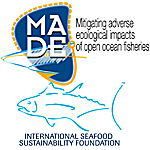The oceanic whitetip shark (Carcharhinus longimanus) is a circumtropical species known as one of the main pelagic sharks worldwide. This species is caught as a bycatch by a variety of pelagic fishing gears such as tuna and swordfish pelagic longlines, pelagic gillnets and purse seines. However, despite its worldwide distribution and frequent catches in most of the high-seas fisheries, little has been published on the species biology and ecology. Particularly, information regarding oceanic whitetip migration, vertical movements and temperature preferences are still almost inexistent. In this context, through the use of pop-up satellite archival tags, the present study provides findings on the species depth distribution, temperature ranges and horizontal movements in the western Atlantic Ocean. Ten sharks were tagged by on board observers during fishing cruises of commercial tuna longliners from the Brazilian fleet. Five tags already transmitted and five are still on the sharks. Tags were attached through a fin loop and retention periods were from 60 up to 180 days. Tagged sharks showed marked preference for warm and shallow waters of the mixed layer. These findings are in favor of promoting deep longline hooks (> 100 m) in order to mitigate the bycatch of this species.
- Presentation

 PDF version
PDF version
